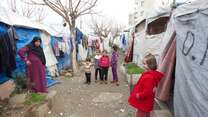Working in partnership between INGOs and local civil society organizations has increasingly become the implementation model of choice among donors, policymakers, international practitioners, and local organizations. Many public donors have created policies and initiatives that encourage local ownership through collaborative decision-making approaches, helping put local expertise and solutions at the forefront when responding to crises, whether as a result of conflicts or natural disasters, as well as for the post-crisis recovery phase. Research and global advocacy efforts highlight how and why local civil society partners bring a wealth of contextual knowledge and experience that external organizations often lack. However, the theory and practice of how an effective organization works, particularly how it responds and adapts to public needs when faced with humanitarian crisis, can be shared by larger, more experienced organizations like an INGO. This kind of experience and knowledge sharing has been shown to be helpful, and it is often welcomed by both civil society organizations and the constituents they serve.
This paper explores the theory and practice of organizational development, in particular, the process through which INGOs work in partnership with their local staff and leadership to help strengthen partners’ ability to serve as effective service providers, public advocates, and leaders. The IRC undertook a 6-month research project that reviewed literature around partnership and organizational development. It also aimed, in particular understanding, to assess its own practices with local partners, with a focus on organizational development strengthening. A close look at organizational strengthening of local partners in 5 country programs revealed a common approach woven together with tools commonly used by organizational development practitioners. However there is variability and some country programs can face more challenges than others in this respect. IRC staff and leaders expressed the need for a systematic partnership strengthening approach in order to better respond to organizational development strengthening requests from its local partners.
The literature review highlights the growing trend toward mutual partnership among INGOs and local civil society organizations. It also introduces some evidence and new thinking around organizational development and its important role in strengthening local partners around the world.
The paper also explores the field of organizational development, including the tools and frameworks that are frequently employed. It further introduces new ideas that should be considered among practitioners, both local and international.
Additional insights based upon the evidence reviewed as part of our research support the view that working in partnership leads to better, more creative solutions for the world’s complex humanitarian and development problems. The evidence, however, is not always clear, and often takes a flavor of advocacy rather than informed research. Similarly, the field of organizational development has been in existence for nearly half a century and yet, it is an ongoing challenge to cite any one process, method, or tool that will lead to a well-functioning, sustainable organization -- let alone one that is equipped to respond to human needs while remaining indefinitely sustainable.
Finally, the paper helped set the stage for IRC’s Learning Event on Organizational Development of Local Civil Society Partners, held on December 9 and 10th, 2015 at IRC Headquarters in New York. This event brought together a diverse group of stakeholders that work in partnership and helped to highlight the type of support and information exchanges that effective partnership must be based upon. These discussions will help to shape how IRC will support current and future local civil society partners. In addition, the ideas and recommendations made by local partners at the event represented and especially important contribution that will be taken into account by the IRC as it develops a strengthened approach to organizational development of local partners.



